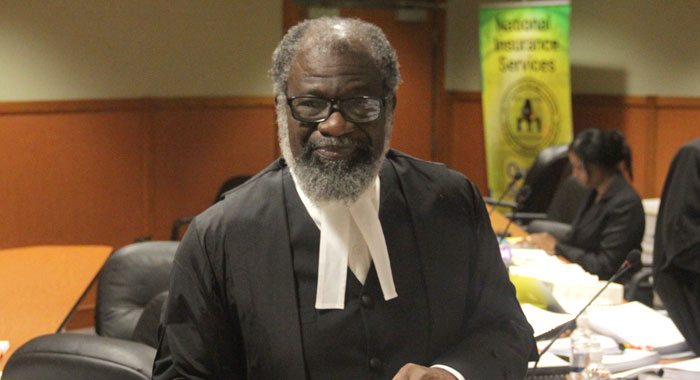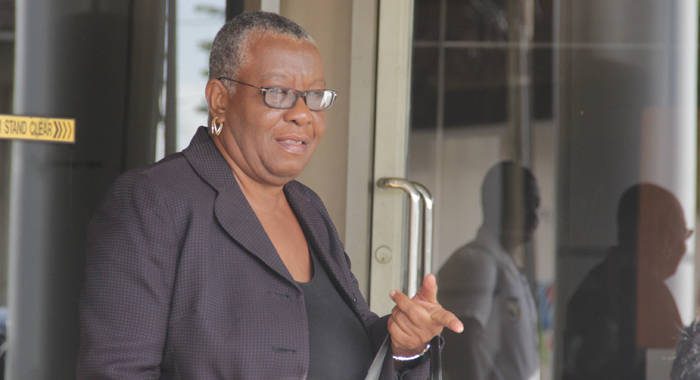Sylvia Findlay-Scrubb, who was supervisor of elections at the time of the 2015 general elections, which are the subject of two election petitions, has explained her opposition to a motion for inspection of the ballot boxes used in Central Leeward.
“It was my understanding that the preliminary count and the final count of the votes cast in Central Leeward were the same and that I, as the Supervisor of Elections, had not received complaints from any party involved in the election that there were discrepancies, neither on election day, nor afterwards. And further, I had not received any complaints to the contrary, on Election Day, or thereafter.”
Findlay-Scrubb was speaking last week during the hearing of oral evidence in the election petitions case in Kingstown.
The cross examination was conducted by Stanley “Stalky” John, lead counsel for the Central Leeward petitioner, Benjamin “Ben” Exeter.
Exeter represented the main opposition New Democratic Party in the poll.
John told Findlay-Scrubb:
“If you had knowledge that aspects of the election … had been conducted in a manner that is not consistent with the law and the rules as you know them, you would have wanted to have that clarified, wouldn’t you?”
“Certainty, I would have,” said Findlay-Scrubb, who retired as elections chief last April.
In a Dec. 21 2015 affidavit, Findlay-Scrubb said she was aware that there were ballot papers that did not have the official mark on them, but official marks were printed on the counterfoils.
“So you were aware that there were ballots that did not have the official mark printed on them, but that the mark was printed on the counterfoil?” John said.
Yes. I was. That refers to the constituency of North Leeward, which, in my affidavit, I explained that those were the only ballots that came out of a ballot box that I saw. And I did notice that there were a few like that.”
She also said she had seen the claim that there were hundreds of ballots that did not have the official mark on them.
John asked her to read the affidavit of Winston Gaymes, the presiding officer for Central Leeward, where he says:
“The facts are as follows: when I opened the box CLF, I discovered that the ballots in this specific box did not have the initials of the presiding officer or any official mark on the ballots. As a result, I stated that I was minded to reject all the votes in this specific box.
“Mr. Exeter and his lawyers, however, indicated to me that they were not objecting to the ballots and consented to all the votes in the box CLF being counted. That is the time and occasion I said, ‘What is good for the goose is good for the gander.’ I meant that Mr. Exeter’s consent was the right thing to do as both candidates would receive and, in fact, received, votes from this box.”
Asked if, in her opinion, it was correct for Gaymes to take that position, Findlay-Scrubb said:
“I cannot make a decision like that because he would have been operating
under particular circumstances at the final count, all of which I do not know.
I can only trust his judgement as the returning officer, and, given the fact
that the laws says that the returning officer is the person who is responsible
for the conduct of the election in the particular constituency, I think he
would have done what he considered to be the best in the circumstances.”

John noted to Findlay Scrubb that she had said she had familiarised herself with the rules governing elections and that she had further said that she was particular about ensuring that the rules were complied with and the various electoral officers were trained.
Asked if Gaymes had been trained as returning officer, she said yes.
Exeter had, in December 2015, complained that the ballots provided to the presiding officers were already stamped with an official stamp prior to delivery.
In her affidavit, Findlay-Scrubb said that was not the case.
She said: “It seems to me that this complaint has arisen because of certain things I said in an affidavit which I swore on the 21st of December 2015 in opposition to an application made by the petitioners before this petition was filed for the inspection of the ballots and counterfoils, for the constituency of central leeward.”
She further stated:
“There is also the allegation that some ballots did not have the official mark. This is inaccurate. All ballot papers issued to presiding officers had the official mark as required by law. What, however, I noticed, was that in a few instances the official mark was printed on the counterfoil. The counterfoil is part of the ballot paper.”
In December 2015, High Court Judge Justice Brian Cottle dismissed the application to inspect the ballot boxes as a “fishing expedition”.
He later went on to dismiss the petitions as improperly filed, but the Court of Appeal reversed his decision, hence last week’s trial.
Last year, the lawyers for the respondent agreed to inspect the contents of four of the ballot boxes in central leeward, but the petitions legal teams refused the offer because of the attached condition that they could not apply for application to inspect other boxes.
So far, the court has not ordered that the ballot boxes be unsealed.
A ruling in the case is scheduled for March 21.







This is damage control. She is a ULP supporter what else did you expect?